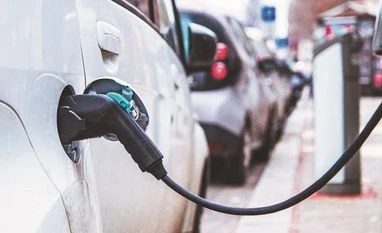Economies of scale to take electric-bus penetration above 70% by 2030
India is expected to become one of the world's major electric vehicle markets by 2030, growing at a 49 per cent compound annual growth rate (CAGR) between 2021 and 2030
)
Representational image
Listen to This Article
Electric buses are anticipated to achieve more than 70 per cent penetration by 2030 across various applications including city, intercity, staff, tarmac, and school buses, according to a report by Hindu Businessline (HBL), citing JBM Auto, a leading electric bus manufacturer in India.
With an annual production capacity ranging between 14,000 and 20,000 buses, the Indian electric bus market already ranks as the second largest globally. If plans proceed as intended and economies of scale take effect, electric bus penetration is projected to grow to around 20 per cent in financial year 2026, up from the current 3 per cent, the report stated.
By 2030, India is expected to emerge as one of the world's significant electric vehicle markets, expanding at a 49 per cent compound annual growth rate (CAGR) between 2021 and 2030, as per the HBL report.
Nishant Arya, Vice Chairman and Managing Director of JBM Auto Ltd, noted in the company's latest annual report that the electric vehicle sector in India is expected to present a total investment opportunity exceeding $200 billion over the next 8 to 10 years. This is mainly due to governmental initiatives aimed at decarbonising the economy.
Also Read: CSM Tech, IIT-M to build autonomously driven electric race car by 2025
Also Read: CSM Tech, IIT-M to build autonomously driven electric race car by 2025
Factors such as consumer demand, product standardisation, technological advancements, and improvements in charging infrastructure have contributed to the rapid growth of the electric bus market in India in recent years.
Also Read
The electric vehicle (EV) industry is further bolstered by governmental support for fleet electrification. Original equipment manufacturers (OEMs) are pivotal in shaping integrated EV ecosystems, thereby aiding the growth of the electric bus industry.
Government Support
The Indian government is facilitating the growth of the electric bus segment through the Faster Adoption and Manufacturing of Hybrid and Electric Vehicles (FAME) II scheme. In addition, the Centre has allocated Rs 57,613 crore to deploy 10,000 electric buses across 169 cities, according to the HBL report.
"This decision is particularly significant as it aligns with India's Net Zero commitment for 2070," Nishant Arya said in the report.
In the past two years, JBM Auto and its affiliated companies have secured orders for 5,000 electric buses to be supplied to various State Transport Undertakings (STUs), Fortune 500 firms, and other major corporates in India.
Also Read: Samvardhana Motherson misses Q1 profit view as higher costs weigh
Also Read: Samvardhana Motherson misses Q1 profit view as higher costs weigh
About the FAME Scheme
Initially launched on April 1, 2015, and subsequently extended until March 31, 2019, the FAME scheme focused on four key areas: demand creation, technology development, pilot projects, and charging infrastructure.
The Centre approved Phase II of the FAME scheme with a budget of Rs 10,000 crore for a three-year period starting from April 1, 2019. The scheme aims to support 7,000 electric buses, 500,000 electric three-wheelers, 55,000 electric cars, and one million electric two-wheelers.
More From This Section
Topics : Electric vehicles sales Electric vehicles in India Electric bus electric buses Electric Vehicles BS Web Reports emerging economies
Don't miss the most important news and views of the day. Get them on our Telegram channel
First Published: Aug 28 2023 | 2:07 PM IST
